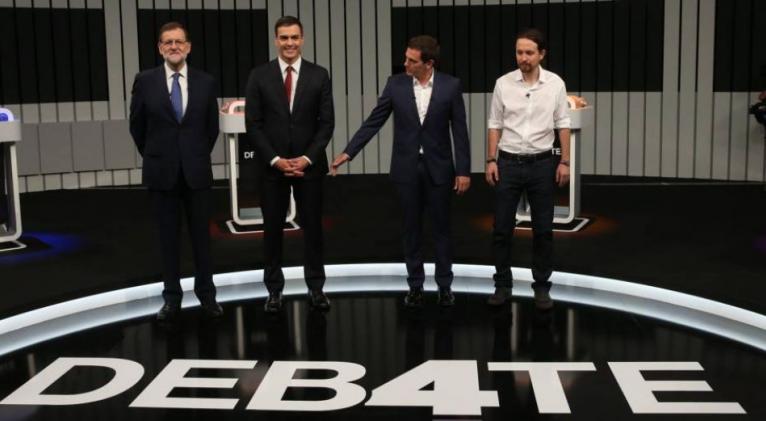Four-way debate suggests little change to Spain’s post-election landscape
especiales

Podemos continues to reach out to Socialists, while acting prime minister Rajoy repeats call for government of national unity.
The economic policies and corruption scandals of the eight years of acting Prime Minister Mariano Rajoy’s administration came under a sustained three-pronged attack during Monday evening’s televised debate between the leaders of Spain’s four main parties.
Reflecting the political shift Spain has undergone in recent years, the debate was the first to put Podemos and Ciudadanos on the same footing as the Popular Party (PP) and the Socialists (PSOE), who between them have dominated politics for the last four decades.
Over the course of the two-hour exchange, which will be the only four-way debate in the run-up to the June 26 elections, Socialist Party leader Pedro Sánchez, Pablo Iglesias of Unidos Podemos and Albert Rivera of Ciudadanos spent most of their time criticizing Rajoy’s austerity policies and his government’s failure to kickstart Spain’s economy after two terms in office.
They also highlighted the numerous corruption cases that have rocked the PP in recent years.
Rajoy defended his record, saying: “To govern is difficult, to preach is easy.”
Rajoy insisted that as the party likely to win the most votes is the PP, he should be allowed to form a government
The four leaders each blamed one another for their failure to reach agreement on a coalition government in the six months since the inconclusive elections of December 20, which gave the PP a narrow lead, but insufficient to form a government on its own.
Sánchez highlighted Podemos’s decision to side with the PP in Congress by voting against an attempt by the Socialists and the center-right Ciudadanos to form a government.
Iglesias was careful to avoid direct confrontation with Sánchez, instead calling on the Socialist leader to team up with Unidos Podemos (United We Can), a coalition with the Communist Party -led United Left. “There are only two options: the PP or a progressive government,” he said.
Opinion polls indicate that the June 26 elections will be a replay of December’s. A survey by Metroscopia, published in EL PAÍS on Sunday, shows the PP will likely win 28.9% of the vote, with the Socialists taking 20.8% and Ciudadanos 15.9%. Unidos Podemos is forecast to win 25.4%.
The four leaders pledged to do everything possible to avoid a repeat of the impasse of the last six months. “There will be no further elections,” said Iglesias, reaching out to the Socialists. Rivera said he would support “a government of change”, without going into further details. Sánchez said he would be mobilizing support among his party’s grassroots, while Rajoy insisted that as the party likely to win the most votes is the PP, he should be allowed to form a government, calling on Ciudadanos and the Socialists to form an administration of national unity.
Iglesias repeated his formula of a broad-left government with the Socialists that would install as prime minister the leader whose party garnered most votes. But Sánchez is unlikely to tolerate playing second fiddle to Iglesias in any future administration.













Add new comment